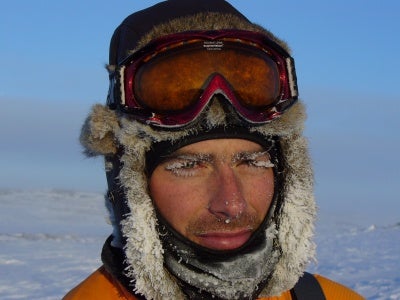What began as a childhood fascination with Artic explorers and building snow forts has grown into an accomplished career leading critical Arctic research for national and international agencies.
Drawn to Waterloo for its renowned co-op programs, Chris Derksen (BES '97, MA '98, PhD '01) found a natural fit in the geography program. As a second-year student looking for his first co-op job, Chris garnered the courage to approach Professor Ellsworth LeDrew and was rewarded with a position that sent him on his first Arctic research project.
Today, Chris is a research scientist with the Climate Research Division of Environment and Climate Change Canada and a world-leading expert on snow with expertise spanning conventional observations, remote sensing, and climate model analysis. His research activities focus on the role of snow cover in the climate system and the implications of climate change on snow, including freshwater availability, Arctic ecosystems, and the carbon cycle.
In the early stages of Chris’s professional career, the potential impacts of climate change were emerging as a research priority. For Chris, this became the primary focus of his research. As the topic became more compelling and broadly accepted within society, so did the need for scientific based findings that could help support policy development and inform the public. Chris has increasingly focused on science communication and public outreach about climate change science. He was lead author of Canada's Changing Climate Report, a science assessment created in an approachable format for non-scientist Canadians and policymakers alike. It was the first climate science assessment specifically produced for Canada, and it landed him an invitation to speak at the Prime Minister’s Youth Summit in 2019.
Chris Derksen, Research Scientist of Environment and Climate Change Canada (BES '97, Geography | MA '98, Geography | PhD '01, Geography)

Chris has a leadership role in the European Space Agency Climate Change Initiative (CCI) Snow project, responsible for the evaluation and application of a multi-decadal time series of satellite-derived snow cover datasets. He is co-chair of two international climate model intercomparison projects to advance understanding of how well the current generation of models simulate land surface processes, and is the science lead for a new satellite radar mission focused on terrestrial snow cover currently under development at the Canadian Space Agency. Between 2016 and 2018, he was responsible for the development and validation of land surface freeze/thaw products for the NASA Soil Moisture Active/Passive mission.
Chris was lead author of the International Panel on Climate Change Special Report on Oceans and Cryosphere in a Changing Climate, and serves as co-editor-in-chief of The Cryosphere.
Since his first trip as a Waterloo undergraduate student in 1994, Chris has participated in more than 25 snow and sea ice measurement campaigns across the Arctic focused on the validation of airborne and satellite remote sensing products. Reflecting on his experience, Chris said he always got the sense Waterloo professors genuinely had the best interest of their students at heart, a value he himself now carries. With adjunct faculty appointments at both the University of Waterloo and Wilfrid Laurier University, Chris has taught undergrad courses, worked with graduate students, volunteered at events and has shared his love of Artic science with school groups from elementary and post-secondary.
Do you know an exceptional alumnus or friend?
We would love to consider them for one of our awards. Please click the link below to nominate them today. It only takes 5 minutes and you could be helping us discover our next award recipient!